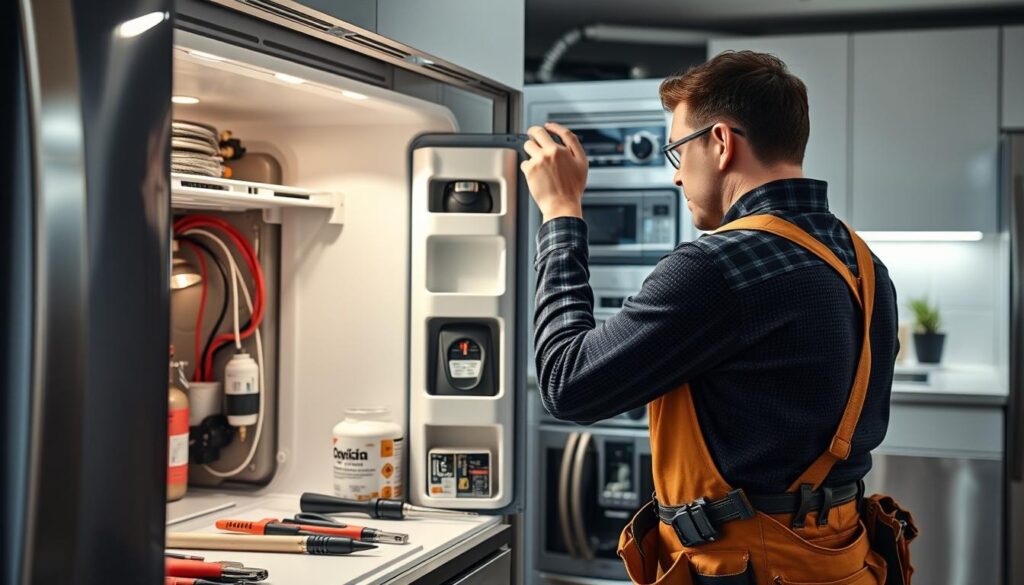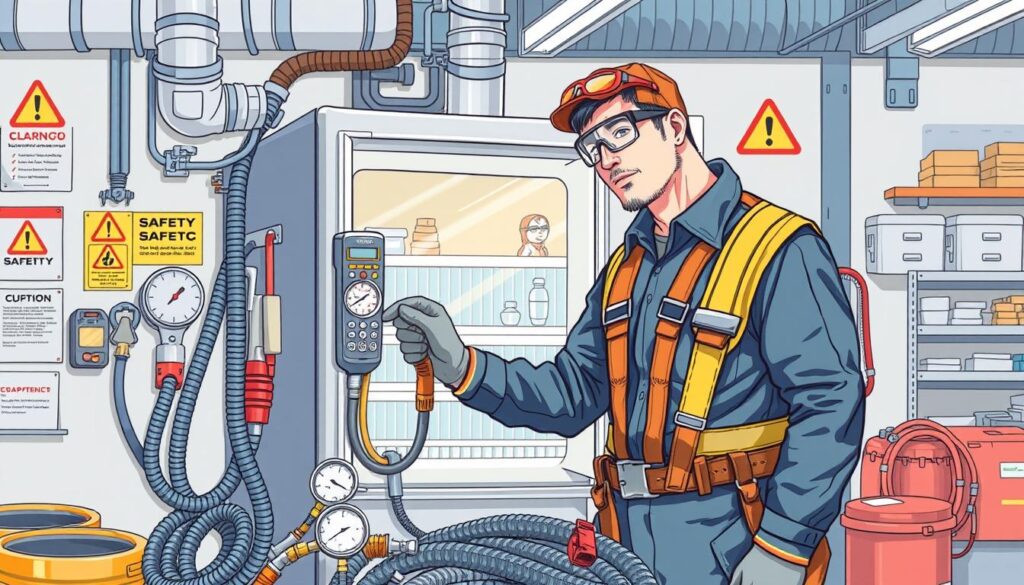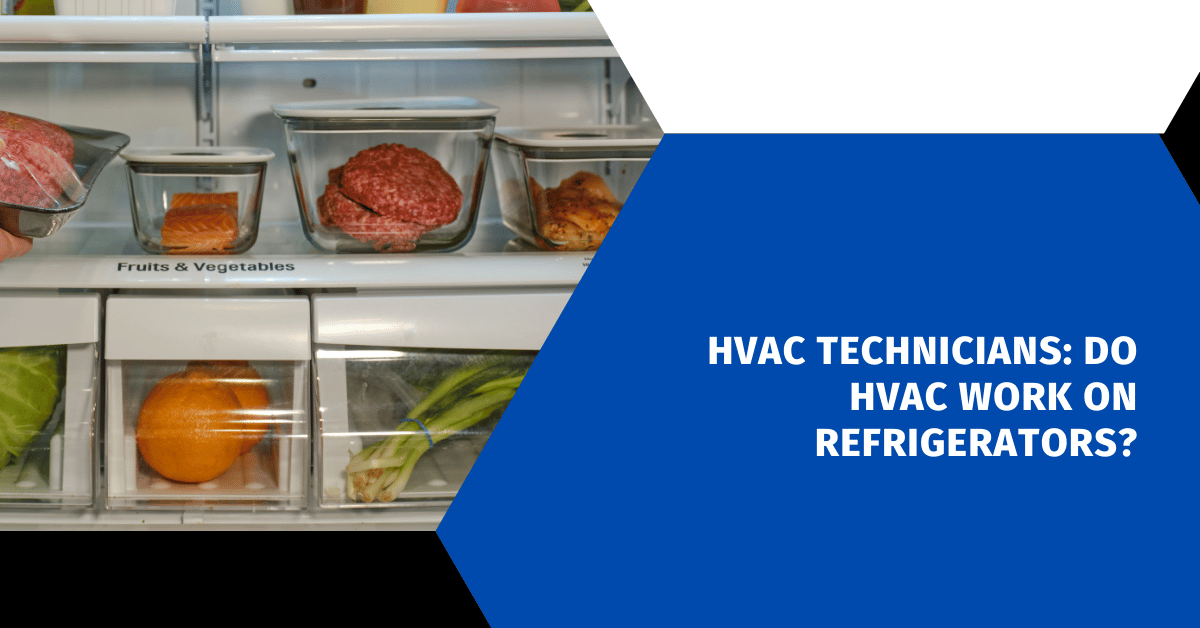Affiliate Disclosure
HVAC Guide Guys is a participant in the Amazon Services LLC Associates Program, an affiliate advertising program designed to provide a means for sites to earn advertising fees by advertising and linking to Amazon.
Do HVAC Work On Refrigerators? As the warm summer sun beats down, you find yourself standing in front of your trusty refrigerator. You’re hoping it will keep your perishables fresh. But what if something goes wrong? Can you turn to your HVAC technician for help, or do you need to call in a specialist?
The line between HVAC (heating, ventilation, and air conditioning) and refrigeration work can often blur. This leaves homeowners and even some professionals unsure of the boundaries. In this comprehensive guide, we’ll explore the key differences between HVAC and refrigeration systems. We’ll also clarify when it’s appropriate to call an HVAC technician versus a dedicated appliance repair specialist.

Key Takeaways:
- HVAC technicians primarily work on large commercial refrigeration systems and building HVAC systems, not household refrigerators.
- Refrigeration technicians specialize in low-temperature systems for preserving perishable goods, while HVAC techs handle high-temperature refrigeration for air conditioning.
- Both HVAC and refrigeration techs require 608 EPA certification to safely handle refrigerants.
- For residential refrigerator issues, it’s best to contact a qualified appliance repair technician who specializes in refrigeration systems.
- The HVAC and Electro-Mechanical Technologies program at Tulsa Welding School offers training for both HVAC and refrigeration technicians.
Table of Contents
Understanding HVAC and Refrigeration Systems: Key Differences
HVAC (Heating, Ventilation, and Air Conditioning) systems and refrigeration systems are not the same. They have different purposes and parts. Knowing the main differences is important for everyone.
Components of HVAC Systems
HVAC systems keep the air inside comfortable for people. They have several parts:
- Heating unit (furnace or boiler)
- Air conditioning unit (compressor, condenser, and evaporator)
- Ductwork for air distribution
- Thermostat for temperature control
- Air filters to improve indoor air quality
Types of Refrigeration Systems
Refrigeration systems cool and keep food and drinks fresh. They are used in many places, like:
- Walk-in coolers and freezers
- Reach-in refrigerators and freezers
- Refrigerated display cases
- Household refrigerators and freezers
Technical Distinctions Between Both
HVAC and refrigeration systems both use heat transfer and the refrigeration cycle. But, they have key technical differences:
| Feature | HVAC Systems | Refrigeration Systems |
|---|---|---|
| Purpose | Regulate indoor temperature, humidity, and air quality for comfort | Preserve perishable items by maintaining very low temperatures |
| Refrigerant | Typically use refrigerants like R-410A, R-22, or R-134a | May use different refrigerants like R-404A, R-507, or natural refrigerants |
| Compressor | Operate at higher temperatures (above 23°F) | Require compressors designed for lower temperatures (below -4°F) |
| Cooling Capacity | Determined by the size of the system and the load | Depends on the mass flow rate of the refrigerant and evaporating/condensing temperatures |
These differences show how HVAC and refrigeration systems work in different ways. HVAC keeps us comfortable, while refrigeration keeps food fresh.
Explore Our HVAC Shop
Looking for top-rated HVAC tools, parts, and accessories? Visit our shop and find the perfect solution for your needs.
Visit the ShopDo HVAC Work On Refrigerators: Scope and Limitations
HVAC technicians and those who fix refrigerators have different jobs. HVAC technicians work on big commercial refrigeration and building HVAC systems, not the small ones in homes. They don’t usually fix common fridge problems because they don’t know as much about them.
HVAC techs handle heating, ventilation, and air conditioning. But fixing fridges needs special skills and knowledge. Even though HVAC techs know some about refrigeration, they can’t fix fridge problems well.
HVAC techs and fridge repair experts share some basic knowledge. But their jobs are very different. HVAC techs usually can’t fix home fridges. That job is for appliance experts with the right skills and tools.
| HVAC Technicians | Refrigerator Repair Specialists |
|---|---|
| Focused on larger commercial refrigeration and building HVAC systems | Specialize in repairing household refrigerators and other small appliances |
| Possess broader knowledge of heating, ventilation, and air conditioning | Have in-depth expertise in the unique components and mechanics of refrigerators |
| May have general understanding of refrigeration principles but lack specialized skills | Trained to diagnose and repair complex issues within refrigerators |
Commercial vs. Residential Refrigeration: What HVAC Techs Handle
HVAC technicians are key in keeping commercial refrigeration systems running. These include walk-in coolers and freezers in stores and restaurants. They are more complex than the refrigerators in homes.
Walk-in Coolers and Industrial Systems
Businesses like grocery stores and restaurants need special help for their refrigeration. HVAC techs can fix parts like compressors and coils. They also do regular checks and cleanings.
Household Refrigerator Requirements
Household refrigerators, however, are usually fixed by appliance repair techs, not HVAC pros. They need different skills and tools than commercial systems.
Even though HVAC techs can work on home fridges, appliance repair specialists handle most repairs. This is their main job.
Explore Our HVAC Shop
Looking for top-rated HVAC tools, parts, and accessories? Visit our shop and find the perfect solution for your needs.
Visit the ShopRequired Skills and Certifications for Refrigerator Repairs
HVAC technicians know a lot about heating, ventilation, and air conditioning. But, fixing refrigerators needs special skills and training. Household appliances have different refrigeration systems than big HVAC units.
To fix and keep refrigerators working, technicians must know a few key things. They need to understand how refrigeration systems work. They also have to find and fix mechanical and electrical problems. And, they must handle refrigerants safely.
Essential Refrigerator Repair Skills
- Familiarity with the inner workings of refrigerators, including compressors, evaporators, condensers, and other critical components
- Ability to identify and address common refrigerator problems, such as cooling issues, ice buildup, and electrical malfunctions
- Knowledge of refrigerant handling, including safe recovery, recycling, and recharging procedures
- Proficiency in using specialized tools and equipment for refrigerator repair
- Strong problem-solving and analytical skills to diagnose and resolve complex issues
Relevant Certifications for Refrigerator Technicians
Refrigerator repair technicians need more than just HVAC certifications. They should get these special certifications:
- EPA Section 608 Technician Certification: This EPA certification is needed for anyone working with refrigerants. It makes sure technicians can safely handle refrigerants, protecting the environment.
- HVAC/R Certification: This certification covers all the basics for HVAC and refrigeration jobs, including fixing household appliances.
- Refrigeration Service Engineers Society (RSES) Certification: RSES certifications focus on the key principles, troubleshooting, and safety in refrigeration and air conditioning.
It’s important for refrigerator repair technicians to keep learning. They should always know the latest in their field. Many HVAC/R employers want technicians with formal training and special certifications. This ensures their service is top-notch.
Common Refrigeration Issues: HVAC vs. Appliance Repair
HVAC technicians and appliance repair specialists each have their own strengths. HVAC experts are great at fixing big refrigeration systems in commercial places. On the other hand, appliance repair pros are better at fixing home refrigerators.
Mechanical Problems
HVAC techs are good at finding and fixing mechanical problems in refrigeration systems. This includes issues with the compressor, fan motor, and condenser coil. They have the skills and tools to fix these problems, keeping big refrigeration units running well.
Electrical Components
Appliance repair specialists are better at fixing electrical problems in home refrigerators. They can find and fix issues with the control board, thermostats, and other electrical parts. These parts are key to a fridge working right.
Refrigerant-Related Issues
Both HVAC techs and appliance repair pros face challenges with refrigerant problems. But HVAC techs usually have more experience with refrigerant handling. They make sure the system gets the right refrigerant.
Fixing refrigeration issues needs a careful approach. It’s different from air conditioning repairs. Both HVAC techs and appliance repair pros need to know a lot about refrigeration to solve problems well.
Explore Our HVAC Shop
Looking for top-rated HVAC tools, parts, and accessories? Visit our shop and find the perfect solution for your needs.
Visit the ShopWhen to Call an HVAC Tech vs. Appliance Specialist
Choosing between an HVAC technician or an appliance repair specialist matters a lot. It depends on the specific problem and the needed expertise.
For commercial refrigeration or HVAC issues in a building, call an HVAC technician. They know a lot about heating, air conditioning, and refrigeration. They have the skills for complex systems.
But, if your fridge at home needs fixing, an appliance repair specialist is better. They know how to fix residential fridges. They get training to keep up with new appliance tech.
- Appliance repair pros need a high school diploma or GED and technical school training. This is for handling refrigeration chemicals.
- They must keep up with new appliance tech to fix them well.
- HVAC repair pros focus on heating, air conditioning, and refrigeration. They have a specific skill set.
- Depending on the state, HVAC repair pros might need a license.
HVAC techs can fix some appliances, like air conditioning units. But for refrigerator maintenance and repairs, an appliance repair specialist is usually the best choice.

Knowing the difference between HVAC techs and appliance repair specialists helps. It ensures your refrigeration problems are fixed right. This saves you time, money, and stress.
Explore Our HVAC Shop
Looking for top-rated HVAC tools, parts, and accessories? Visit our shop and find the perfect solution for your needs.
Visit the ShopProfessional Training Requirements for Refrigeration Work
To become a skilled refrigeration technician, you need to get the right training and certifications. HVAC education programs give a solid base, covering heating, ventilation, and air conditioning. But, for refrigeration work, you also need specific certifications.
HVAC Education Programs
HVAC training lasts from 7 months to 2 years. It teaches students the skills needed for HVAC systems. You’ll learn about electrical systems, ductwork, refrigeration, and troubleshooting.
After finishing, you’re ready for many HVAC tasks. This includes working on cooling systems for homes and businesses.
Specialized Refrigeration Certifications
- EPA Section 608 Certification: This EPA-issued certification is needed for refrigerant handling. It shows you can work safely with these substances.
- HVAC Excellence Certifications: These certifications prove your skill in refrigeration areas like commercial, industrial, and residential.
- NATE Certifications: The North American Technician Excellence (NATE) program certifies your knowledge in refrigeration, air conditioning, and heat pumps.
For a career in refrigeration, you need both HVAC training and specialized certifications. This is true for working in homes, businesses, or industries.
Safety Considerations and Regulatory Compliance
HVAC technicians must focus on safety and follow strict rules. They need to handle refrigerants carefully to avoid accidents and protect the environment.
They must follow EPA rules for refrigerant handling, recovery, and disposal. Not following these rules can cause leaks or spills. This can harm the environment and put technicians and the public at risk.
OSHA also has important rules for the HVAC industry. These rules cover many safety areas, like hazardous materials and electrical safety. They also include rules for confined spaces, respiratory protection, and machinery safety.
HVAC technicians need to learn how to handle refrigerants safely. They must know how to respond in emergencies and use protective gear. This training helps prevent health problems from refrigerant vapors.
It’s important for HVAC professionals to keep up with EPA and OSHA rules. By doing this, they can keep their work area safe and serve their clients well. They also help protect the environment while doing their job.
| Safety Concern | Regulatory Requirement |
|---|---|
| Refrigerant handling and disposal | EPA regulations |
| Hazardous materials, confined space entry, electrical standards, respiratory protection, machinery safety | OSHA regulations |
| Refrigerant exposure risks | Specialized training and PPE use |

“Prioritizing safety and regulatory compliance is essential for HVAC technicians to protect themselves, their clients, and the environment.”
Explore Our HVAC Shop
Looking for top-rated HVAC tools, parts, and accessories? Visit our shop and find the perfect solution for your needs.
Visit the ShopCareer Paths: HVAC and Refrigeration Specializations
The HVAC and refrigeration industry has many career paths for skilled people. You can work on commercial HVAC systems or help homeowners with their needs. There are lots of specializations to explore.
Commercial Opportunities
For those interested in commercial work, there are many roles. Commercial HVAC technicians install, maintain, and fix HVAC systems in big buildings. Refrigeration technicians work on refrigeration systems like ice machines and coolers.
Residential Service Options
Working with homeowners can be very rewarding. HVAC installation technicians install new systems, focusing on specific types. HVAC maintenance and repair technicians keep systems running well.
There are also roles like energy auditors, HVAC engineers, HVAC sales representatives, HVAC instructors, and HVAC business owners.
| Career Path | Focus Area | Key Responsibilities |
|---|---|---|
| Commercial HVAC Technician | Commercial Buildings | Install, maintain, and repair complex HVAC systems in commercial properties |
| Refrigeration Technician | Refrigeration Systems | Install, maintain, and repair refrigeration equipment like ice machines, beverage coolers, and walk-in coolers |
| HVAC Installation Technician | Residential HVAC | Install new HVAC systems, often specializing in air conditioning or gas furnaces |
| HVAC Maintenance and Repair Technician | Residential HVAC | Maintain and repair existing HVAC systems in homes |
The demand for efficient HVAC and refrigeration solutions is growing. This means many opportunities for skilled professionals in HVAC and refrigeration.
Tools and Equipment Used in Refrigeration Repair
Fixing refrigerators and other cooling systems needs special tools and diagnostic gear. These tools are different from those used for heating, ventilation, and air conditioning. As an HVAC tech, having the right refrigeration repair tools and diagnostic equipment is key to solving cooling problems efficiently.
HVAC tools for fixing refrigerators include leak detectors, vacuum pumps, and special gauges. These tools help find and fix issues with the cooling system. For bigger commercial units, you might need more heavy-duty equipment than for home appliances.
- Staple guns ($15-$40)
- Drills ($30-$200)
- Tape measures ($10-$40)
- Screwdrivers and nut drivers ($10-$70)
- Pliers ($15-$70)
- Hammers ($25-$70)
- Safety gear like gloves ($15-$30), masks ($10-$30), and goggles ($15-$20)
- Coil fin straighteners ($10-$20)
- Manometers ($35-$80)
- Gauges ($40-$100)
- Multimeters ($20-$40)
- Refrigerant recovery machines
- Infrared thermometers
- Flaring tools
- Digital manifolds
- Electronic leak detectors
- Inspection mirrors
Software tools for managing HVAC and refrigeration businesses are also important. They help with marketing, accounting, payroll, and scheduling. These tools can make your business more efficient and profitable.
It’s important to keep your refrigeration repair tools and diagnostic equipment in good shape. This ensures they work well and safely when you’re working on cooling systems.
Conclusion
As an HVAC professional, you might also work on refrigerators. But, HVAC and refrigerator repair have different jobs and skills. HVAC techs work on big systems, while fridge repair is for appliance experts. Both careers have great growth and pay.
Choosing HVAC or fridge repair, you’ll find many rewarding jobs. HVAC techs keep places comfy, and fridge experts keep food cold. With the right training and skills, you can succeed in your career.
The need for HVAC and fridge pros is growing. It’s a good time to look into these careers. Knowing the differences helps you pick the best path for you.

